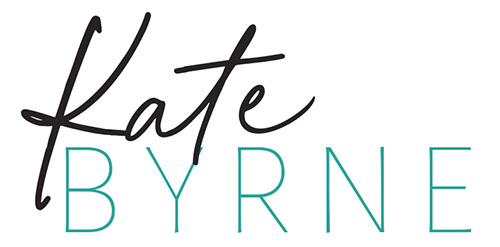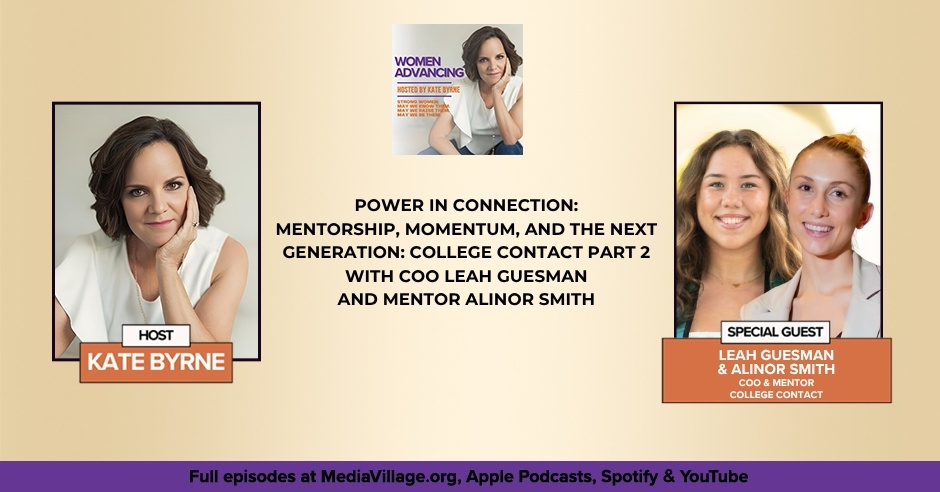
Personal connections and consistent support can truly alter the trajectory of a student’s life, a fact explored in depth with Leah Guesman, COO of College Contact, and Alinor Smith, a dedicated mentor. In this engaging episode, we delve into the transformative power of mentorship, revealing how it goes beyond simply providing information to building genuine, lasting relationships. Leah discusses College Contact’s commitment to human connection and matching students with mentors who understand their experiences, while Ali shares her personal journey and the impact of having one trusted adult believe in her. Together, they highlight how consistent showing up, active listening, and vulnerability can make all the difference for first-generation and underrepresented students, ultimately shaping lives and creating a ripple effect of positive change in education.
—
Watch the episode here
Listen to the podcast here
Power In Connection: Mentorship, Momentum, And The Next Generation: College Contact Part 2 With COO Leah Guesman And Mentor Alinor Smith
This episode is a reminder that real change doesn’t come from just bold ideas. It comes from people bold enough to show up, stay in it and keep building. I’m joined by Leah Guesman, COO of College Contact, our second episode with her who is helping to reimagine how we support students on their college journey and beyond. Alongside her is Alinor Smith AKA Ali, who is a mentor in the truest sense of the word. Someone who doesn’t just show up for a student but shows up with them, beside them and doesn’t leave their side.
What do we talk about? Very many amazing things like what it means to create access and why the work doesn’t just stop once someone gets in the door. The difference one person can make simply by listening and hence, shaping lives. Yes, I mean plural. Not just one life. How trust, lived experience, and your own vulnerability can change the game for first-gen and underrepresented students. Why advance sometimes looks a lot like just sitting down, listening and saying, “You’ve got this and I’ve got you. I’m not going anywhere.”
Finally, a house like true success. That’s intrinsic and resilient. Can you imagine, what if we didn’t have to have the hardships that make it so that we have to be resilient in the first place? It’s a conversation about purpose, about partnership and the ripple effect of showing up and all that goes after. Let’s get into it.
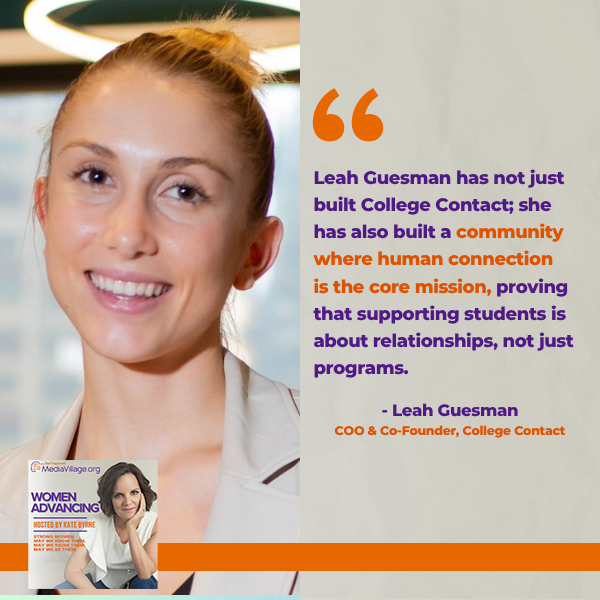
We’re going to try something new because I’m feeling a little frisky. I am excited to invite back because of popular demand one of the Founders of College Contact Leah Guesman, who is the COO and have one of her key righthand folks who helped see the whole program start from duct tape and glue to the amazing fast moving machine that it is now and that is Alinor Smith AKA Ali, who is an active mentor. Ladies, welcome to the show. Thank you for joining.
Thanks for having us.
Thanks for having us, Kate. It’s great to be on again.
Rekindling Connection: The Heart Of College Contact’s Mission
I appreciate it. The response to the first episode that we had together, Leah, was off the charts. I’m happy that we’re able to make this happen. Before we go and take a peek into Ali and all that she brings to the party. I want to take a step in, point out and ask, what’s your approach to making impactful personal and not just programmatic at College Contact because some are so speeds, feeds, bits and bytes and just transactional. What do you think you all do to help not make that be the case with you?
This question drives home our core mission and what we spoke a little bit last time about holding true to that golden nugget of personal connection as the business continues to grow and scale. What we’ve always done from day one when it was just a few undergrads helping some high schoolers until now. We’re having thousands of kids and hundreds of mentors that prioritize human-to-human connection to making sure that students are getting connected with mentors, who they see themselves in, who they relate to and then making sure that human connection is sustained.
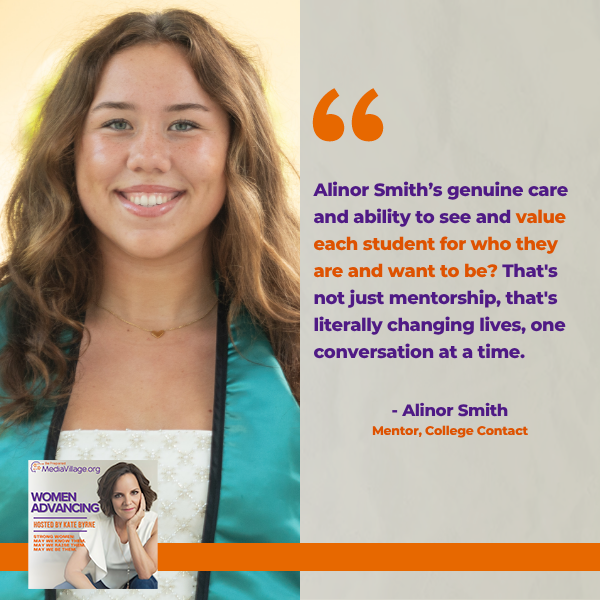
It’s not just about getting this or that objective done but it’s also about building a friendship, a relationship and giving students someone that they can count on who they know is in their corner believing in them and rooting for them. That’s the magic of College Contact. It’s those interactions between students and mentors that helped inspire kids to reach for their dreams and push themselves further than they might have had they not had a mentor.
I know that’s helpful and I know when we were talking about the whole notion in the program about mentors. You were so clear with Ali. Let’s talk a little bit about Ali. Ali, you can either choose to hear or close your ears. What made her stand out as a mentor? What qualities do you think make her relationship with her mentees so meaningful?
Number one, she was one of our earlier mentors. Not only was she always on the ball, very organized, and very communicative but also had the gusto to work with our systems in our early days when we were reminding mentors every ten minutes about what was coming up. When there wasn’t a centralized platform for them to keep track of everything, it took her even a little more to be a mentor in those days.
Ali shines in those respects but even more than that, now I’ve just heard that she’s going to do Teach for America and all the pieces make sense because she’s such a compassionate and thoughtful mentor, leader, and teacher. That came through to her students and made them feel comfortable with her, which is 90% of the battle when you start working with the student. It’s just making sure they feel comfortable so that they’re open to growing, learning, and working with you. She has a serious gift for that and we recognize that right away from her kids.
Uncovering The Spark: Identifying Great Mentors
It’s nice to be showered. One last question before I head over to Ali, is this, Leah. You see that because you’ve mentioned it a couple times, Ali, interacting with her kids. Prior to that, how do you spot that spark when you’re in the process of looking for mentors? Is there some little a-ha moment?
It’s a few things. For one, people who are good listeners tend to be good mentors. There are people who are wit-smart and super on top of it, but if they want all the air time when you’re speaking to them, they might not be the best person to go in and listen to a student, hear what they’re saying, read between the lines and truly understand them. People who are good listeners and attentive within ours is number one.
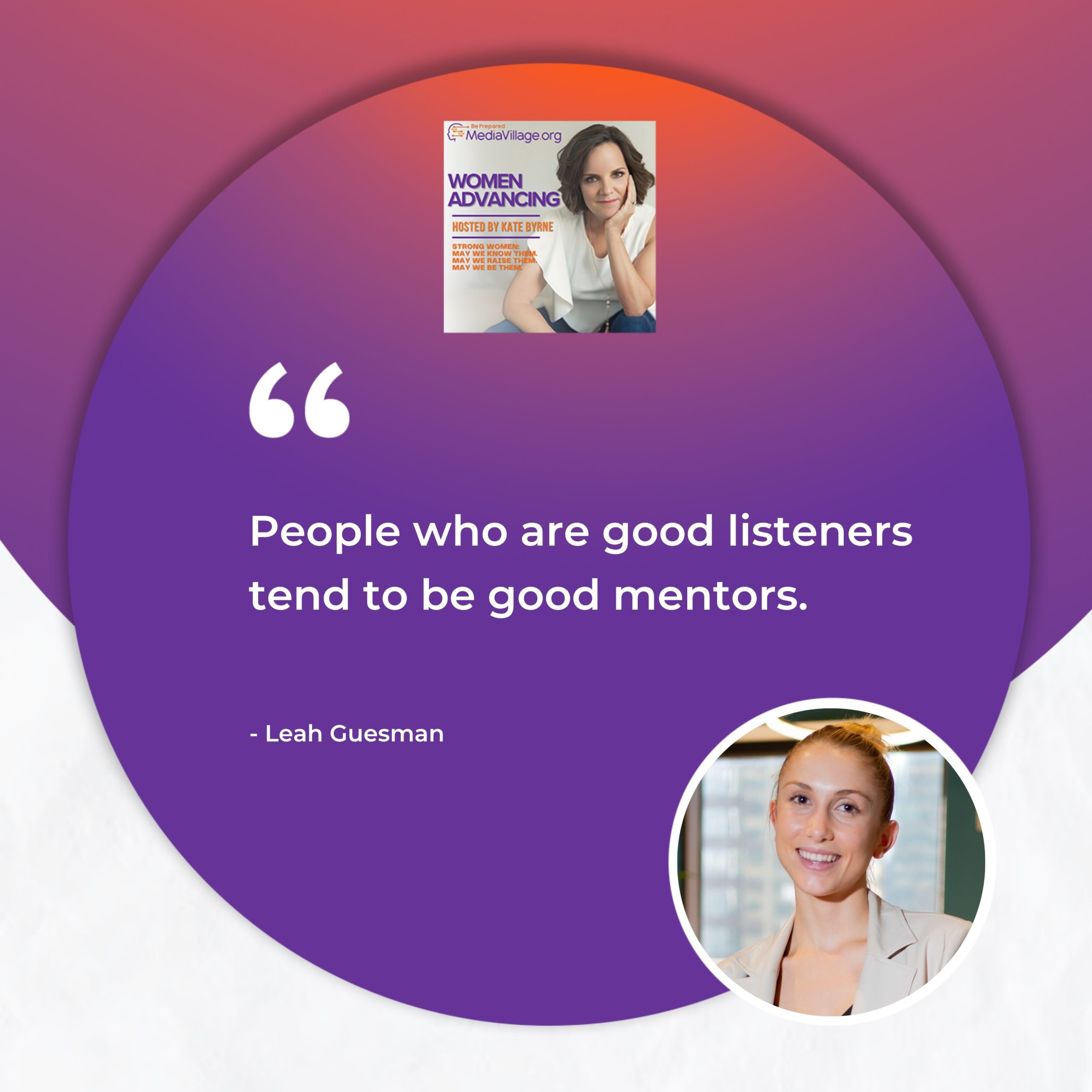
The other thing I would say is, a mentor is going to make a student feel comfortable but they’re also going to make pretty much anyone that they speak to feel comfortable. They’re going to be enjoyable to talk to. They’re going to smile. It’s not going to be all like doom and gloom when we’re running a case study or doing practice sessions. We underestimate that like when you’re in a video call, especially but in-person too, smiling, making eye contact, being open and seeming like you’re engaged and excited to interact with whoever you’re speaking to.
That’s a huge piece of it. The last thing I’ll say is people wear this giving back, this interest in students and mentorship. It’s already riddled in their background. You can hear from the things they highlight about themselves. The activities they participated in previously. Their reason why they’re doing this. Not just to get another stamp on their resume or get some work experience but because maybe they experienced in high school stress or concern or fear about this transition and now they saw this opportunity and they’re like, “I wish I’d had that person but at least now I can be that person for someone else.” The real excitement about that I would say is also a big part of it.
That makes sense. Ali, first off, congrats for the TFA.
Thank you so much.
From Personal Struggle To Guiding Light: Ali’s Mentorship Journey
I look forward to hearing more about that experience. That might be part three built upon it for sure. In the words of that song, how did you get here? What brought you to mentorship in the first place?
What called to me was, I was working a summer job when I first found out about College Contact. It was the summer between my second and third year, if I’m right, Leah. That’s in UVA terms. In regular terms, it’s sophomore and junior, but I was just looking for something. I had joined the public policy school and UVA. I called back. I was interested in educational policy, childhood rights like childhood policy in general. I wanted to get into that education world because I don’t believe that you can enact change without knowing what it’s like to live that life.
For a while, I did live that life. I was a student in the K-12 world, for as long as all of us who finished high school are. I struggled through the college application process a lot. What brought me to mentorship? I didn’t have a formal mentor because of the price. As I said before, I was working a summer job. I was working in service and in tourism. I wasn’t doing the things that I wanted to, but it was because I had to make ends meet. I literally had to do this so that I would have food for myself and that’s how I grew up as well.
I started working when I was fourteen years old. The only thing that brought me into college, I was talking about this with a friend. I had no idea what liberal arts colleges was, until I joined College Contact. I had no idea that was a thing. I only applied to state colleges and Ivy leagues because I thought those were the only colleges that existed. I had no idea that any other school existed. I went to UVA and I got a full ride. It has been such a fantastic ride. I’m graduating soon. I feel like the mentor that I had who was my English teacher, who went out on a limb for me because she saw that inner spark and that inner fire that Leah was talking about.
I want to enact change and college was my next step to make that greater change. I just appreciate her for being there for me when I didn’t even know if that was a viable option for me considering I knew that I needed to make money from a very young age. I wasn’t quite ready yet to understand that college was an investment and a step in the right direction to have greater financial freedom and control. You’re eighteen years old and you don’t have a lot of money. You’re thinking like, “I need to make this work for me. I need to make this work for my family.”
I looked around and applying to college. I realized College Contact was a way that I could pay forward what I have received, what I was lucky enough to receive and what I sometimes lacked. I now have the tools to translate the hidden curriculum of success that you don’t learn typically if you’re going to a lower income high school or your family or your first gen in your family. I have that roadmap now. I had given it to myself and it would have been such a shame to have it end with me. That’s like the leg I was looking forward to give back to my community and that’s what drew me.
It’s going to be incredibly invaluable too given all the crazy that is going on with the political climate, shifts that are being made and how education in particular is being hit so hard and we haven’t even begun to see it from both sides.
Don’t even get me started.
The parents also. I know you were one of the early day mentees and helped one of the first B2B kids. Did you see some of yourself or was there anything or any relational thing that you had?
I felt like I was looking in a mirror but like a few years ago. It was a little bit different, though, because I feel like my mentee was a little bit more quiet than me. I’m a very boisterous, exuberant type of person but I feel like the quietness is always rooted, as Leah was saying, the desire to listen and to know what’s going on in your environment. I felt that in her. I felt that. I had to bring it out. When we were first talking, what I like to do is I start not talking about the thing that worked here to talk about.
The quietness is always rooted in the desire to listen and understand what’s happening in your environment. Share on XI’ll ask them, what are you excited about? What are you excited about in your life now? What are you doing? That always shocks them I feel, especially the question, what are you excited about because typically, they’re asked like, how was your day? How’s the weather? Small talk, but asking questions that are related to the whole College Contact thing but also are more like, I care about you as a person. If what you’re excited about is something that we can’t put on your resume or put on a personal statement essay, that’s fine. I care about you as a whole being and that is the most important part. That eventually brought my mentee out of her shell.
It’s so rare and it’s crazy going into a teaching environment, especially Teach for America. That’s like all I’ve been taught. I’m telling you. Basically, the lessons at Teach for America’s are teaching me. It is rare for students to feel seen. I hardly felt seen all throughout like my time in school. It was hard for me to bond with teachers. Even though those were the very people that held, as I was saying before, that unspoken curriculum of a roadmap to success.
If you can’t make relationships with those people, if you don’t know how to make relationships but I don’t think that it’s up to you as the student to be making the relationships. It is up to the adult. I do believe that. I want to make relationships. I want to understand that person as a whole person. One anecdote that happened on the topic of jobs is what she was saying. I think she started her sentence with something like, “This is stupid, but I recently got a promotion.” I was like, “What do you mean this is stupid?” She was working at a fast-food restaurant at that point. She was like, “I got a promotion to a hostess or a hostess to a server.”
I was like, “That’s not small. That’s huge. That means you worked hard. You showed up long enough for somebody of your manager to look at you and trust you and to see you are a person who deserves this. You are deserving of that.” It takes a lot to get to know somebody and I get that. It’s just a little question over time that stack up and once you learn more about them and you keep showing up. They realize they’re not going to leave. They’re going to do their best to give me what I need. It just goes to show, it’s always about equity, hearing these kids out, knowing them for who they are and who they want to be, and not the mistakes that they’ve made in the past.
It’s always about equity, hearing these kids out, knowing them for who they are and who they want to be, and not the mistakes that they’ve made in the past. Share on XThat’s such a great way to think about kids in general. It’s like I want to know you as a person for who you are and who you want to be and guiding them like little caring hands to push them in the right direction that will help them achieve their goals. She impacted me in so many ways. It pushed me to do the career that I’m about to do now. Talk about impact. That is an incredible impact.
The Power Of Showing Up: Unconditional Support, Trust Building, And Changing Lives
Essentially, showing up consistently is the best foundation and unconditionally. You’re hearing them out and you’re not saying, “That doesn’t fit into this little Excel spreadsheet of job opportunities.” This is who you are and this is what you want. What are the things we can do to make sure that we can put you on that path? It also builds trust out the gate. What do you wish more people understood about the value of that showing up, especially for students who haven’t always had someone show up for them? I know you got to see it to be it thing but what you’re talking about goes beyond that.
What do I wish more people understood about that? It’s a complex question because I feel like I have a pretty good grasp on it because I was that kid who was lacking in those support systems and because I was that kid who had one person show up. A good lesson that I learned in college was taking these public policy classes. I was very interested in educational equity, so I took a lot of educational equity classes. In the first class that I took with her, she explained that students need one person. This is the most key takeaway.
If a student at home has a horrendous family life and they have never felt hurt. Early intervention is key, but even when you’re talking about high schoolers. When you become that one trusted adult, you hold the power to literally pull them out of poverty or change their lives. It’s not just like, “I’m doing this. I’m showing up. This means nothing. I’m going to work day after day.” You could literally be the changing factor that changes a kid’s whole life.
I don’t exactly know that study off the top of my head but I would love to send that over to you. It only takes one. I think that’s the title of the study and it takes one trusted adult. If it’s not in the family, then it can be a coach. If it’s not a coach, it could be a teacher. If it’s not a teacher, it could be a social worker. It takes one person to help another person get to where they want to go. I think hearing that and then doing College Contact, it all fall into place. I was like, this is exactly what they mean by that.
It takes one person to help another person get to where they want to go. Share on XWhat I also think it’s important for everyone who’s reading to think about, too. It’s literally showing up and listening. That’s it. It’s not even, “I have to give.” You don’t have to give money. You don’t have to give the job. It’s not what it is. It’s like human-to-human, heart-to-heart, hands open, how can I help? It doesn’t have to be this big because so many people are like, “I don’t have time.” It doesn’t take that long.
It’s just about caring about others. I care about my boss as much as I care about my students as much as I care about my friends. I care about everyone in my life. It might be a different level of caring. I might know the intricacies of my friend’s dating life and not of my students. If they’re willing to share that with me, I’m here to listen. I’ve been a mentor in a lot of different scenarios. Before even doing Big Brother with College Contact or BTV with College Contact, I did a mentor in Charlottesville with middle school students. A little bit younger than like the students that I’m talking about now.
I had a mentee back then who I would see every single week for an entire school year. We started out the school year with goals, and I remember something. She loved drawing. Throughout the whole year, I was like, “Are there any pictures that you’ve made?” It’s those little things where they realize, “You remembered that I like art. You remembered that I liked drawing.” Can you imagine what that would mean if that happened to you?
Redefining Success, Leadership, And Resilience Through Shared Experiences
It mattered. Leah, I want you that same question in terms of, what do you wish people understood about the value of showing up especially for students who haven’t always had someone to do that for them?
To echo a lot of what Ali said, just like having someone who’s invested, not just in your future but in you is huge. For high schoolers, there’s so much pressure around, what are you going to do, what’s your next step, and what’s going to come next. For a lot of the kids that I’ve met in our programs, it makes them shut down a little bit because they’re just like, “I don’t know. I don’t have anything going for me.” I always tell kids, “If you think you have nothing to write your college essays about, chill out. We’re going to help you. You have plenty. You lived eighteen years. You’re going to be fine.”
Helping them all know that they are interesting and valuable and wonderful where they are. The reason that our mentors and our model is able to do that so well is because it feels so genuine coming from someone who’s that little bit older than you. It feels less patronizing and more genuine coming from someone who you feel like understands the spot you’re in. I love Ali. It’s so funny because as an early mentor, I feel like Ali had to do and know a lot of things without us necessarily explicitly training or teaching them to her and so much of what you hit on are things that we now trained mentors in.
I was just training a group of mentors for a school program. I was talking and I was like, “You want to make sure you’re talking to them about what’s going on now, what they’re interested in, what they’re going to be up to this summer, or how they’re feeling about things. When you’re checking in with them, you don’t always have to check in about homework and assignments.” You can check in about like, how’s that basketball camp going? Are you doing well or did you end up getting that summer job at Baskin-Robbins? I’m rooting for you.
Giving them attention and value now, regardless of what happens post-graduation, what happens and what’s coming. Once that confidence and self-esteem starts to build in age 15 years old, 16 years old, or 17 years old, or whatever, suddenly, that light at the end of the tunnel, that goal post starts to become clearer and feel way closer than it did when you didn’t have that confidence. That’s my roundabout way and probably echoing exactly what Ali said.
I would even go so far as to add, not ask them as well. A lot of my most valuable relationships have come with me being vulnerable as well as with me explaining what’s going on in my life, what I’m dealing with and what I’m excited about. Especially if they see themselves in me. It’s like, “This is what my future could be like.” That is an added bonus I would say with being vulnerable.
How has it shaped your view of success, resilience and leadership?
I’m going to like try to narrow these to specific groups because at large, the start-up world or school admin world or student world or mentor world, I could probably talk about this for 15 to 20 minutes. My view of student success has been shaped by how we make the student feel. What Alinor both do around like making students feel secure and feel like they have someone in their corner. Sometimes, there are kids who miss meetings and our programs.
There are kids who don’t show up to the workshop. There are things that happen curriculum wise that aren’t our favorite. Our bottom line is we want these kids to be better off because they had a mentor and they worked with a mentor and feel more supported and feel that they have this person. We want them to feel better off than they would have without us. If they get 8 of their 10 deliverables done, we’d love for it to be ten.
We’re always going to be working for it to be ten, but if they get 8 of their 10 deliverables on and they believe that their future has value and are inspired to try to put more effort into their future and to stay committed to their future goal. That is way better than having 10 of 10 deliverables done but they hate their mentor and they hate us because we’re harassing them.
Finding what success is and being clear about that definition for ourselves, our mentor, or students, it’s so important. In terms of leadership, as a control freak, I have learned so much. Ali like the mentors have you to thank for just like having a certain level of trust in the mentors and knowing that they can do this and they’re capable. Now even bringing them up to help us with things like training, student outreach and student management. Honestly, coming from a mentor, a lot of kids are more responsive than mentor than to an adult.
Giving more rope to the people that I’m leading or to the network of mentors has been a big lesson for me in leadership and believing what we say. These mentors are so amazing and they can do so much. Let them and not micromanage them. Part C, resilience. For me, I would say there’s a bajillion lessons in resilience I could talk about. The amount of inspiration I get from our students, our mentors, and the school administrators that I talked to in the deep belief in the students and in their future despite what’s going on politically, in a family, and what the school’s budget or resources are.
The commitment that the people we’ve worked with have had to helping these students shine, believe in themselves, and achieve a meaningful future. That resilience is so inspiring to me and I see it in our mentors, the administrators we work with and in the students. If you can get through to them, they do become hopeful about their futures. They are excited about their future and extremely resilient and have had to go through much more than I’ve had to go through.
In terms of resilience, I would say I’ve learned a ton of lessons from all of those people and a lot of inspiration for myself to get over my hill of beans day-to-day, myself and stick with them. Be arm and arm with all those people that are continuing to push for these students to have access to amazing futures and be able to look right and look left and say, “I’m not going to quit either. We’re all in this together.” That is so meaningful to me and listening to Ali talk. I’ve had chills twenty times. I’ve been on the verge of tears twenty times. You are such an inspiration and that’s why I wanted you to come on the show because you’re such an example of what this program is all about.
Thank you. I can go right from there. I saw success as a person who literally had to fight tooth and nail to be able to let in through the doors, 1) As a lower income student. 2) As like a woman in a lot of cases. Especially that I had applied to UVA versus an engineer and I pivoted a lot. I feel like I was fighting to be seen and that’s what I thought success was. It was fighting and then you make it to the end and you burst through the door. All of a sudden, there were going to be all these accolades and everyone’s going to love you.
Everyone’s going to invite you to a million different things and that’s not what it is, mentorship especially. All the different types of mentorships that I’ve had showed me that success is not waiting for you at the opening of the door. There isn’t going to be a million people cheering you on. First of all, it’s intrinsic satisfaction. Second of all, the actual greatness comes behind you. I was interviewed for Teach for America and they said, “How would you think about success?” I remember saying this in my interview. I said, “Success to me means being able to lead someone in the same career as me to a better outcome than I ever achieved.” I still believe that.
I still believe that success isn’t just like going through the door, bursting through and being like, “This is the epitome of success.” Sorry, this is a metaphor. I’m a poet. It’s like, “No, it’s holding the door open for people behind you,” and letting them step on your toes a little bit. Being like, “I want you to do this. I want this to be the opening door so that you can get to further doors, so that you can have the opportunity to reach those doors further on that in this world that we live, the society, dare I say, that we live in. That’s not always going to be the case, especially if you didn’t grow up with extreme amounts of wealth or privilege.
Success isn’t about bursting through a door and declaring, ‘This is it—I’ve made it.’ Real success is holding the door open for those behind you and letting them step on your toes a little bit. Share on XSecondly, mentorship is talking about resilience. I’ve always had mixed feelings about the word resilience. It gets used so much as a person who has been through a lot of hardship. It feels like a buzzword. It feels like a way to be like, “You’re a resilient person,” and not going deeper and understanding the systemic and the actual systemic and personal hardships that I went through to be seen as a resilient person. It’s a way to admire someone’s pain without doing anything to alleviate it.
It’s more like looking at the outcome as opposed to what was the root cause because, hopefully, one would wish you never have to be resilient.
You would think and yet people are always craving for people to be resilient. The thing that I want to do for my kids, as I said, hold that door open. Let them step on my toes so that they don’t have to experience the bad things that I experienced or even though it’s made me into a great person but I had the building blocks to be able to cope with this and also therapy. We love therapy. That’s one thing. More than that, resilience is like speaking up and advocating for yourself. Also, for others who haven’t yet found their voice. Resilience is weirdly asking for help because if you don’t make it through something, then you want resilient.
It’s like people won’t see you as resilient if you never made it through. That’s what I believe. When I think about the kids that I’ve mentored and the student that I was, resilience is never passive. These kids are going out on a limb to be like, “I deserve this.” That is so important. Having deserving like the value within themselves and to be like, “I deserve to go to college. I deserve to have a mentor to help me go to college.” It’s these little things.
Mentorship taught me to reckon with my feelings toward the word resilience. It taught me that I shouldn’t be glorifying this struggle. On the other hand, I should be honoring the growth that comes out of a struggle. Mentorship has taught me to lead with more intention, especially tenderness and also vulnerability. All of that is resilience and people think resilience is fighting to the nail now. It’s like compassion and tenderness. That is what real resilience is.
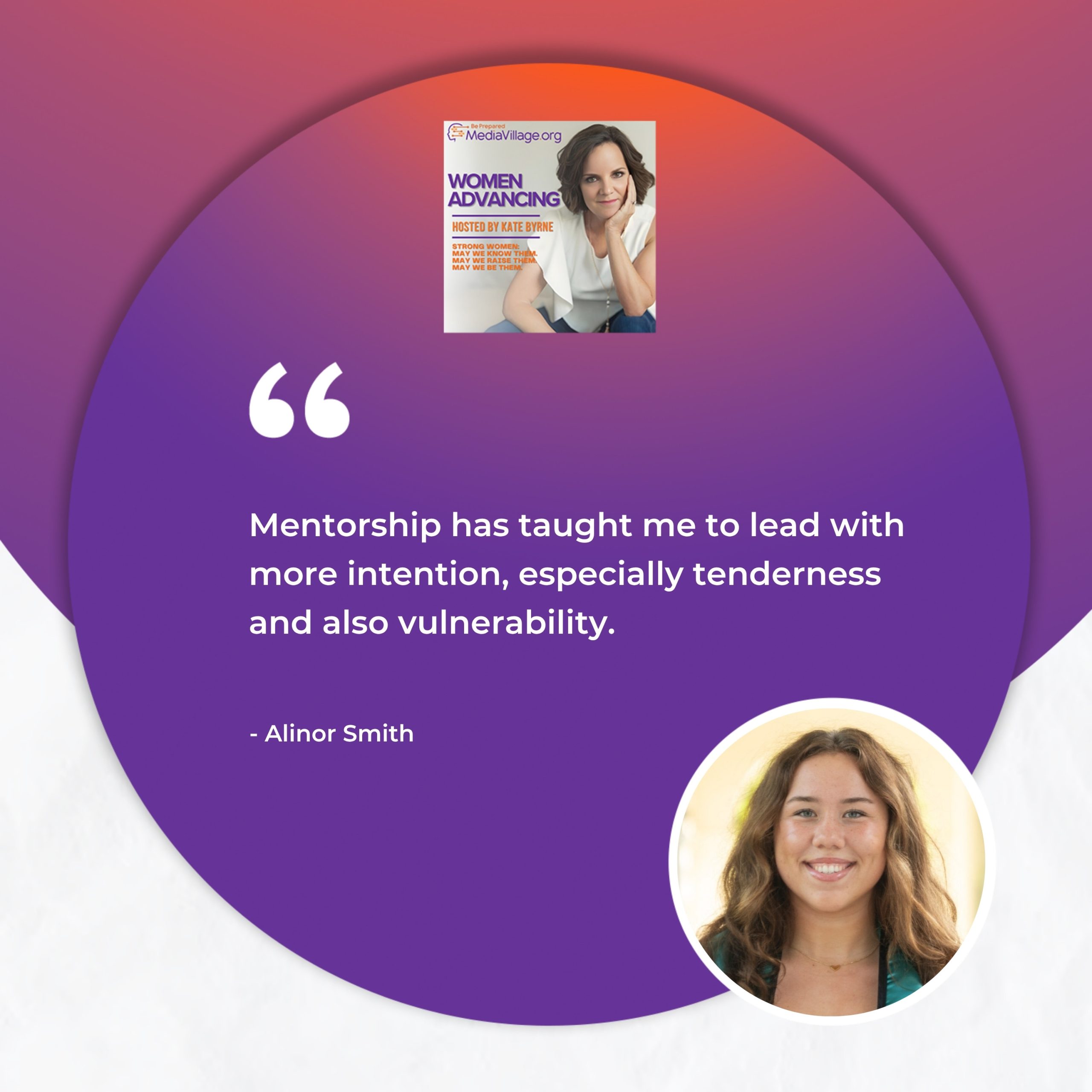
You refuse to give up on these people even when the odds are stacked against everyone. That’s a more radical resistance or resilience. That’s what I believe. The last part of that is leadership. The leader that I want to be is believing in someone and being a person everything that I’ve already said before, honestly. I can’t say it better. I’ve set the bar too high for someone. That’s what I have to say.
I can’t think of a better note to finish the conversation on. I love that notion of resilience. I hadn’t stopped to think about that because it’s true. This goes back to all the work that you all are doing at College Contact, even handedness, equitable and trying to give everyone a chance. It doesn’t have to be hard. Ali Smith, thank you. Thank you, Leah Guesman. Now, you know what we’re going to do. We’re going to have to do part three. In a few months, after the beginning of the school year, we’re going to hear about Teach for America.
That would be lovely. I would be happy to share my takeaways. I’m both scared and excited.
That’s the best thing but remember there is such a thin line between excitement, anticipation and fear. You’re excited.
I feel like I’m straddling both of them.
I can only imagine. Seriously, thank you both so much. I appreciate it. Readers, so many pearls than not. Thank you for reading. I look forward to the time we get together again.
Thank you.
Thank you for having us.
—
Reflecting On The Conversation: Key Takeaways And Future Impact
What a chuck of block full conversation that leaves behind so many amazing takeaways and its path. Here are my faves. I could go on and on, but I’ve narrowed it down to these. First and foremost, it only takes one person who can literally change the trajectory of a life and it doesn’t have to be with money or getting a job. Those are all great things. It’s literally showing up, keep showing up and more importantly, all you’re doing when you do, listening and remembering. We could all take two seconds and do that for a person and realize regardless of your age. Everybody needs that.
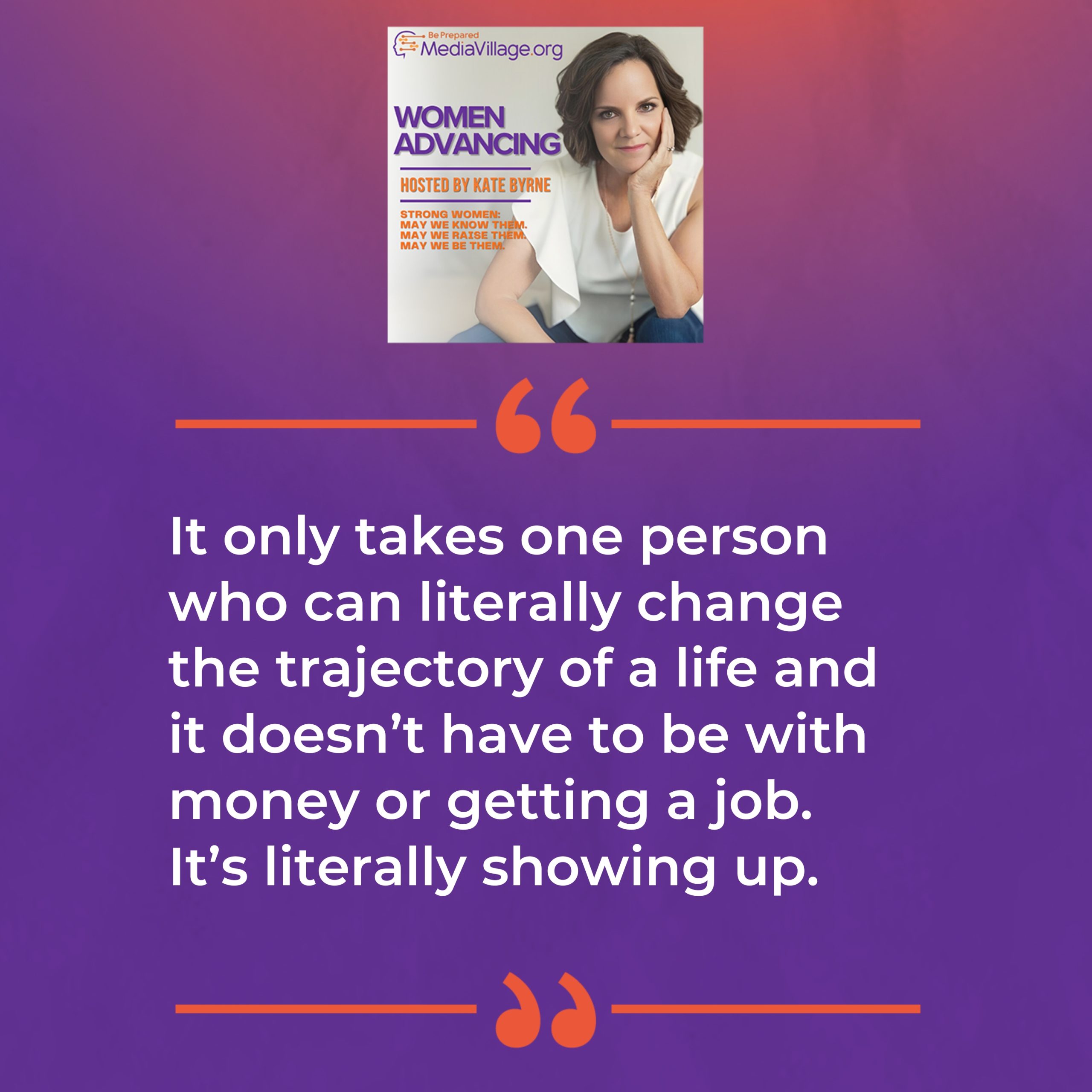
I love the way that Leah put the term look right, look left and lock arms. We’re all in this together. Again, anchoring that notion that you’re not going to be abandoned. We’re here for the duration. I thought it was beautiful to hear the shift that Ali went through from seeing success rather than it being this fight, the struggle, this drive and this edge. It’s got to be this battle rather than looking outside. Success is getting so down with it just being your own intrinsic satisfaction. Everybody at every age and me, can be reminded of that.
It landed with me when she painted that visual of the whole notion of holding that door open for others and this is the key piece to me. Letting them step on your toes a little bit as they move forward and move ahead because that’s what it’s all about, helping others, giving them a leg up and then setting them on their way. Finally, a mind-blown notion of resilience. Ideally, we probably don’t want to be resilient because it’s true, you don’t wish resilience on anyone because it means they had a lot of hardship. Wouldn’t it be amazing?
Yes, I’m a Pollyanna. I know, and an optimist and perhaps a little diluted one giving all the state of the crazy world that we’re living in but how great would it be if people didn’t have to be resilient because things were set up and everyone understood that there’s plenty of room for everyone. With that, thank you for continuing to read. I would love to hear what you think your takeaways were from this. I’d love to hear your definitions of success and leadership and resilience, too, or what’s been a situation that you’ve just recently experienced where you had to have and demonstrate resilience. For now, take care and I look forward to the next conversation.
Important Links
- Leah Guesman on LinkedIn
- Alinor Smith on LinkedIn
- Alinor Smith on Instagram
- College Contact
- Teach for America
About Leah Guesman
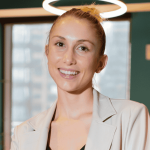 Leah Guesman is the Co-Founder and COO of College Contact, an innovative platform revolutionizing postsecondary advising. Originally from Los Altos, California, Leah graduated from the University of Virginia’s McIntire School of Commerce in 2023 with degrees in Marketing and Economics.
Leah Guesman is the Co-Founder and COO of College Contact, an innovative platform revolutionizing postsecondary advising. Originally from Los Altos, California, Leah graduated from the University of Virginia’s McIntire School of Commerce in 2023 with degrees in Marketing and Economics.
Passionate about education equity, Leah’s advocacy began in high school, where she served on a site council focused on improving student equity. She also tutored English language learners during the pandemic and was one of College Contact’s first mentors.
Leah joined Sophie Smith as a co-founder in 2023, combining her business expertise with her commitment to expanding access to college and career resources. She leads the development of partnerships with schools and nonprofits, enabling College Contact to reach thousands of students. Leah is driven by her mission to democratize college counseling and empower students from diverse backgrounds to achieve their postsecondary goals.
About Alinor Smith
 Alinor Smith is an emerging leader in education and equity-driven policy. A recent graduate of the University of Virginia, she studied Public Policy and Leadership through UVA’s Batten School and English through the College of Arts & Sciences.
Alinor Smith is an emerging leader in education and equity-driven policy. A recent graduate of the University of Virginia, she studied Public Policy and Leadership through UVA’s Batten School and English through the College of Arts & Sciences.
During her time at UVA, she worked with College Connect for two years, where she supported first-generation and low-income students navigating the college process—an experience that galvanized her commitment to educational justice.
She is now entering her first year as a Teach For America corps member in New York City, where she will teach high school English. Her work in the classroom is grounded in the belief that good policy begins with listening to those most affected—and that storytelling, especially through literature, remains one of the most powerful tools we have for equity.
